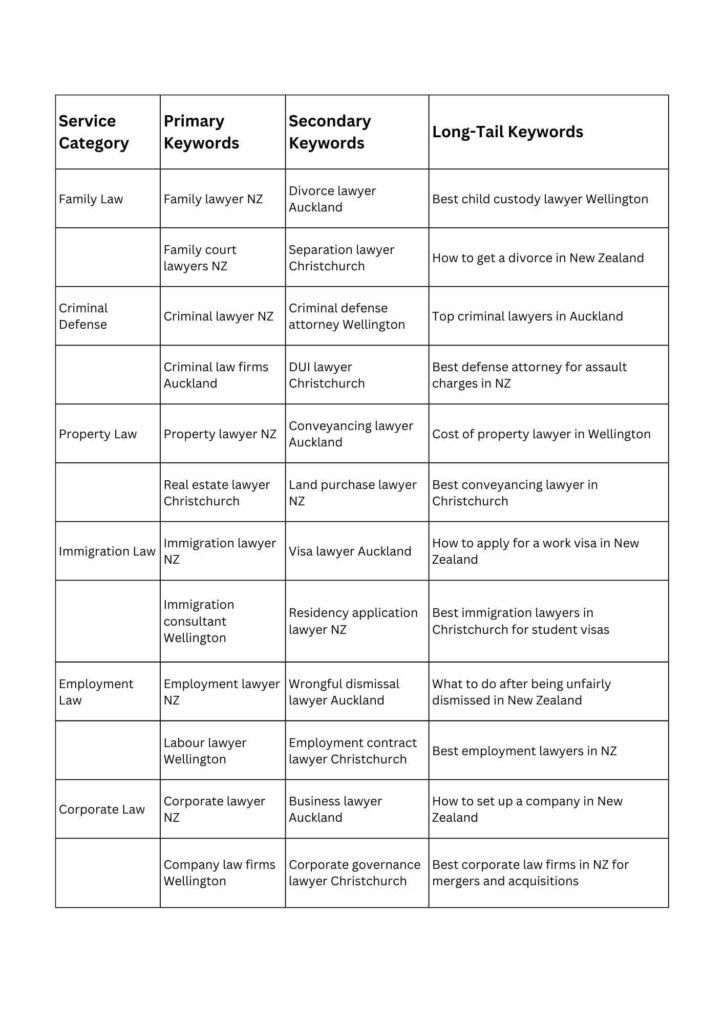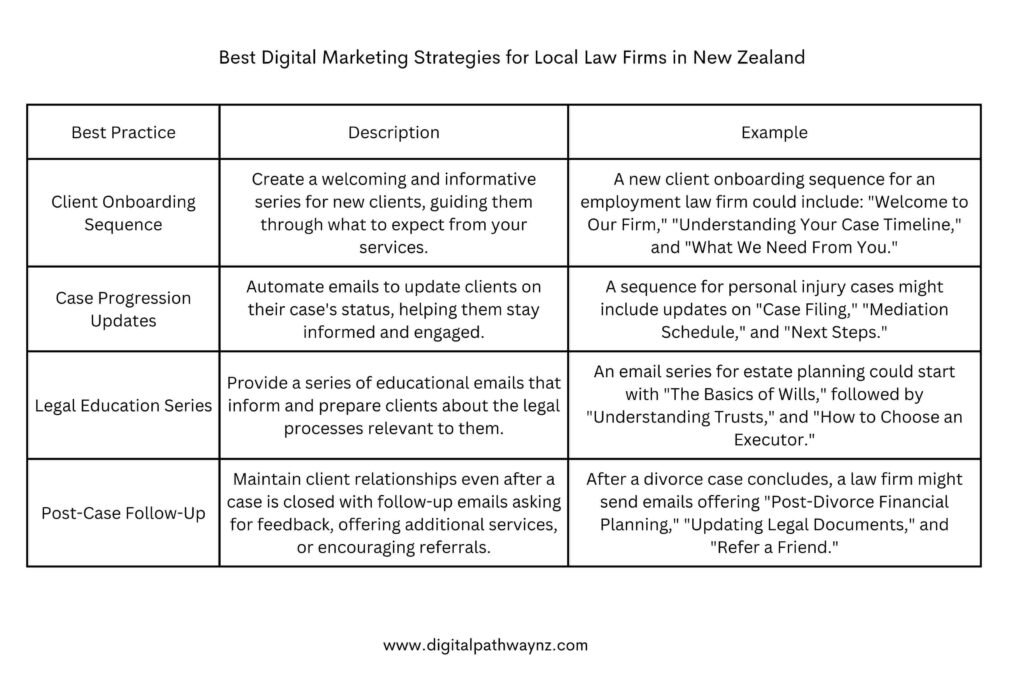In a competitive legal market like New Zealand, law firms must leverage effective digital marketing strategies to attract clients, build trust, and establish their presence online. Whether you’re a small practice or a large firm, these strategies can help you reach potential clients and grow your business. Here’s a comprehensive guide to the best digital marketing strategies for local law firms in New Zealand, including the importance of targeting the local market and optimising your website with service-specific pages.
1. Search Engine Optimisation (SEO)
SEO is critical for law firms aiming to increase their online visibility and attract clients searching for legal services. By optimising your website with relevant keywords and local SEO practices, your firm can rank higher in search engine results.
- Keyword Research: Identify keywords that potential clients might use, such as “Auckland family lawyer,” “Christchurch criminal defence attorney,” or “property law services NZ.”
- Local SEO: Focus on local SEO by optimising your Google Business Profile and including location-based keywords like “Wellington law firm” or “lawyer near me” in your content.
- Content Marketing: Regularly publish blogs that address common legal questions or issues, such as “How to Choose the Right Lawyer in New Zealand” or “Understanding NZ Property Law.” This helps attract organic traffic and establish your firm as a thought leader.
- On-Page SEO: Ensure your website is optimised with meta tags, headers, and URLs that include primary keywords. Additionally, fast loading times and mobile optimisation are essential for user experience and search engine rankings.
- The following table provides examples of keywords that a law firm in New Zealand might target, categorised by legal service:

2. Pay-Per-Click Advertising (PPC)
PPC advertising is a powerful tool for law firms, allowing you to gain immediate visibility on search engines for specific legal services.
- Targeted Campaigns: Create campaigns targeting specific services, such as “divorce lawyer Auckland,” “employment law advice,” or “NZ immigration lawyer.”
- Geographical Targeting: Focus your ads on local areas where your potential clients are most likely located, such as Auckland, Wellington, or Christchurch.
- Ad Extensions: Use ad extensions to include additional information like contact details, service links, or client reviews, making your ads more attractive to potential clients.
- Remarketing: Implement remarketing strategies to target users who have visited your website but haven’t taken action, encouraging them to return and engage with your services.
3. Content Marketing
Content marketing is essential for law firms to demonstrate their expertise and build trust with potential clients.
- Educational Blogs and Articles: Write content that addresses common legal issues or questions in New Zealand, such as “What to Do After a Car Accident in NZ” or “The Process of Buying Property in New Zealand.”
- Case Studies and Success Stories: Share case studies or success stories that highlight your firm’s expertise and successful outcomes for clients.
- Video Content: Create videos that explain complex legal processes or offer advice on common legal matters. These can be shared on your website, YouTube, and social media channels.
- Ebooks and Guides: Offer detailed guides or ebooks on specific legal topics in exchange for visitors’ email addresses. For example, “The Complete Guide to NZ Employment Law” or “Understanding Family Law in New Zealand.”
4. Social Media Marketing
Social media platforms offer law firms an opportunity to engage with the community and promote their services.
- Platform Selection: Focus on platforms like LinkedIn, Facebook, and Instagram, where you can share informative content, legal updates, and client testimonials.
- Targeted Advertising: Use Meta Ads (Facebook and Instagram) and LinkedIn Ads to target specific demographics and geographic locations. For example, target ads specifically to business owners needing legal advice or families seeking legal counsel. Here’s how you can make the most of targeted advertising using various strategies:
- 1. Interest-Based Targeting
- Interest-based targeting allows you to show your ads to people based on their interests, activities, and pages they have liked on Facebook or Instagram. This method is particularly effective for reaching individuals who may need specific legal services.
- How It Works: You can target users who have shown interest in legal topics, such as “family law,” “immigration,” or “property law.” For instance, if your law firm specializes in family law, you can target users who are interested in parenting, divorce, or child custody.
- Benefits: This type of targeting ensures your ads reach people who are more likely to need your services, increasing the likelihood of conversion.
- Examples: A law firm specializing in immigration could target users interested in travel, foreign languages, or international news, as these interests may indicate a potential need for immigration services.
- 2. Demographic Targeting
- Demographic targeting allows you to tailor your ads based on specific demographic criteria, such as age, gender, education, and marital status. This is essential for law firms that offer services tailored to specific life stages or legal needs.
- How It Works: You can target your ads to individuals within specific age groups or life stages, such as young professionals, retirees, or newlyweds. For example, if your firm offers estate planning services, targeting older demographics might be effective.
- Benefits: By focusing on specific demographic segments, you can create more personalized and relevant ads, which tend to perform better in terms of engagement and conversions.
- Examples: A firm offering divorce services might target individuals aged 30-50 who are married or separated, ensuring that the ads reach those most likely to require such services.
- 3. Geographic Targeting
- Geographic targeting, or geo-targeting, allows you to focus your ads on users in specific locations. For local law firms, this means ensuring your ads are shown only to people within your service area.
- How It Works: You can narrow your ad audience to specific cities, regions, or even postal codes. This is particularly useful for law firms operating in urban areas or serving specific communities.
- Benefits: Geo-targeting ensures your ads are seen by people who are within a feasible distance of your office, increasing the chances of them reaching out for a consultation.
- Examples: A Wellington-based law firm could target ads specifically to users in Wellington, Hutt Valley, and Porirua, ensuring that the firm’s services are promoted to potential clients in those areas.
- 4. Lookalike Audiences
- Lookalike audiences allow you to reach new people who are similar to your existing clients. This is one of the most powerful targeting options available on Meta Ads.
- How It Works: Meta uses data from your existing client base (such as those who have visited your website or engaged with your content) to find new users with similar characteristics. You can create a lookalike audience based on data from your email list, website visitors, or even your social media followers.
- Benefits: Lookalike audiences expand your reach by targeting users who are likely to be interested in your services because they share similarities with your current clients.
- Examples: If your law firm has a strong client base in corporate law, you can create a lookalike audience based on your existing corporate clients to attract similar businesses or professionals.
- 5. Custom Audiences
- Custom audiences allow you to target ads to users who have already interacted with your law firm, such as previous clients, website visitors, or email subscribers.
- How It Works: You can upload a list of email addresses or phone numbers (for Google Ads the minimum number of the emails is 1k), or use data from website visits (via the Meta Pixel) to create a custom audience. This audience can then be targeted with specific ads tailored to their previous interactions with your firm.
- Benefits: Custom audiences are highly effective for remarketing, allowing you to re-engage potential clients who have already shown interest in your services.
- Examples: A law firm could use custom audiences to retarget individuals who have visited their website but didn’t schedule a consultation, encouraging them to take the next step.
- 6. Behavioral Targeting
- Behavioral targeting focuses on the actions users take online, such as purchasing habits, device usage, or interaction with specific types of content. This can be particularly useful for targeting individuals who have shown interest in legal services.
- How It Works: Behavioral targeting uses data on users’ online behavior to show ads that are relevant to their recent activities. For example, you might target users who have recently searched for legal advice or visited other law firm websites.
- Benefits: This approach increases the relevance of your ads, as they are shown to users who are actively seeking services like yours.
- Examples: A firm offering employment law services might target users who have been reading articles about workplace disputes or visiting job search websites.
- 1. Interest-Based Targeting
- Community Engagement: Engage with your audience by hosting Q&A sessions, sharing legal tips, or participating in local community discussions.
- Live Sessions: Host live webinars or Q&A sessions where you discuss recent legal changes or answer common legal questions.
5. Email Marketing

Email marketing allows law firms to maintain contact with potential clients and keep them informed of legal updates.
- Newsletter Campaigns: Send regular newsletters with updates on legal changes, case studies, and tips relevant to your audience.
- Example Newsletter Campaign:
- For a law firm focusing on immigration law, the monthly newsletter could include:
- Legal Updates: Recent changes in immigration policies.
- Case Studies: Success stories from clients who have successfully navigated the visa process.
- Legal Tips: Advice on preparing documents for visa applications.
- CTA: “Download Our Comprehensive Visa Application Guide.”
- Automated Email Sequences: Create automated email sequences for different stages of the client journey, such as an email series for new clients or ongoing cases.
- Example Automated Email Sequence:
- For a law firm offering services in commercial law, an automated sequence could be set up as follows:
- Email 1: “Welcome to Our Firm” – An introduction to the firm’s team and services.
- Email 2: “What to Expect During Your Case” – Outlines the steps involved in the client’s specific legal process.
- Email 3: “Preparing for Your First Meeting” – A checklist of documents and information the client should bring.
- Email 4: “Mid-Case Update” – A status update on their case.
- Email 5: “Final Case Review” – Summary of the case and next steps after the conclusion.
- Personalisation: Tailor emails to specific client needs, offering relevant legal advice or updates that matter to them.
- Lead Magnets: Offer free resources like legal checklists or guides in exchange for email sign-ups, helping you build a list for future marketing efforts.
6. Google Business Profile
A well-optimised Google Business Profile is crucial for local SEO and helps your law firm appear in local search results and Google Maps.
- Complete Profile Information: Ensure your Google Business Profile includes all relevant information, such as your firm’s name, address, phone number, business hours, and website link.
- Add Photos: Upload high-quality images of your office, team, and any relevant documentation that highlights your professionalism.
- Customer Reviews: Encourage satisfied clients to leave positive reviews and respond to all reviews promptly. This can significantly enhance your firm’s credibility.
- Post Updates: Regularly post updates on legal news, upcoming events, or changes in your services.
7. Design Your Website with Service-Specific Pages
Having a well-structured website with dedicated service pages is essential for converting visitors into clients.
- Service Pages: Create dedicated pages for each service you offer, such as “Family Law,” “Criminal Defence,” or “Property Law.” Each page should be optimised with relevant keywords and provide detailed information about the service.
- Clear Call to Action (CTA): Ensure each page has a clear CTA, such as “Schedule a Consultation” or “Get Legal Advice,” to guide visitors towards taking action.
- Mobile Optimisation: Ensure your website is mobile-friendly, as many potential clients will access your site from their mobile devices.
- Trust Signals: Include testimonials, accreditations, and trust badges on your service pages to reassure potential clients of your expertise and professionalism.
8. Targeting the Local Market
Targeting the local market is crucial for law firms, as clients often prefer working with a lawyer who understands the local laws and community.
- Localised Content: Create content that is relevant to the local market, such as blog posts on “Understanding NZ Property Laws” or “Navigating the Auckland Legal System.”
- Community Engagement: Participate in local events, sponsor community organisations, or collaborate with local businesses to increase your firm’s visibility in the community.
- Local PPC Campaigns: Run PPC campaigns targeting specific regions within New Zealand, such as “Wellington Family Law Services” or “Auckland Criminal Defence.”
- Geo-Targeted Social Media Ads: Use geo-targeting features on social media platforms to reach users in specific areas, ensuring your ads are seen by the most relevant audience.
9. Referral Programs
Referral programs can be particularly effective in the legal sector, where trust and word-of-mouth are critical.
- Client Referrals: Offer incentives, such as discounts on future services or referral bonuses, for clients who refer new customers to your law firm.
- Partnerships with Local Businesses: Establish referral partnerships with local businesses, such as real estate agents, financial planners, or insurance brokers, to create a network that benefits all parties.
- Tracking Referrals: Use CRM software to track referrals and ensure that rewards are distributed fairly and promptly.
10. Webinars and Online Events
Hosting webinars and online events can help your law firm connect with potential clients and establish your expertise.
- Educational Webinars: Offer webinars on specific legal topics, such as “Understanding Employment Law in NZ” or “Navigating NZ’s Family Law System.”
- Q&A Sessions: Host live Q&A sessions where potential clients can ask questions about their legal concerns and receive real-time advice.
- Collaborations with Experts: Partner with other legal experts or related professionals to offer comprehensive webinars covering various legal issues.
Conclusion
The digital marketing landscape for law firms in New Zealand is competitive, but with the right strategies, your firm can stand out. By implementing SEO, PPC advertising, content marketing, social media engagement, email marketing, and optimising your Google Business Profile, your law firm can attract more clients, build trust, and grow its presence in the local market. Whether you’re a small firm looking to establish your online presence or a larger firm aiming to expand, these strategies will help you achieve your goals.
